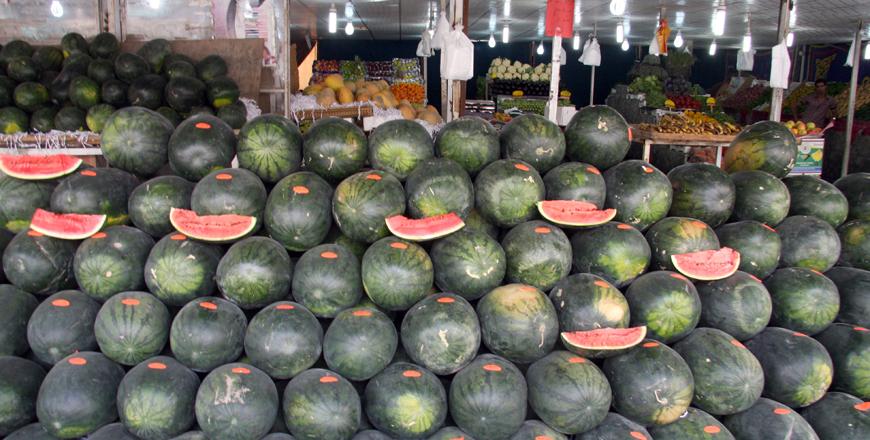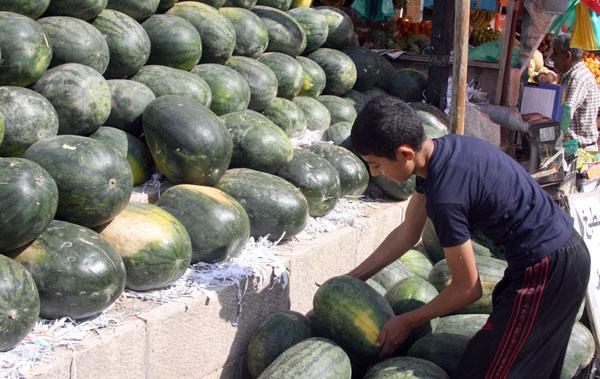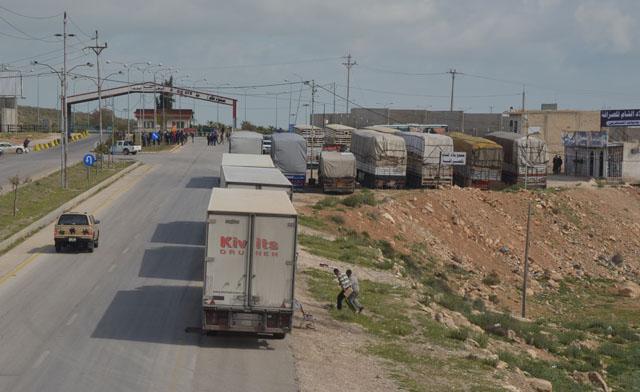You are here
Syria border closure bad news for farmers, exporters — ministry
By Hana Namrouqa - Apr 04,2015 - Last updated at Apr 04,2015

AMMAN — Jordan’s closing of its borders with Syria will have a negative impact on the country’s exports of fruits and vegetables, a government official said on Saturday.
“Closing the Kingdom’s borders with Syria is undoubtedly bad news for farmers and exporters, but everyone knows that regional instability is taking its toll on the export and import movement,” Agriculture Ministry Spokesperson Nimer Haddadin told The Jordan Times.
Jordan last Wednesday closed its border with Syria for security reasons. Passenger and cargo traffic across the border was halted as a result of escalating violence in the Syrian town of Nasib, near the border crossing.
The decision to close the Jaber border station was primarily taken with the aim of saving the lives of passengers as Nasib town has been witnessing “fierce” confrontations between forces loyal to the Syrian regime of President Bashar Assad and armed opposition groups.
Jordan’s other border crossing with Syria, Ramtha, has been closed for nearly four years except for humanitarian assistance to the war-torn country in compliance with a UN decision taken last year.
“The agriculture sector is expected to incur losses, especially since the country exports 90,000 tonnes of fruits and vegetables annually to Syria and Lebanon,” Haddadin said.
The spokesperson added that Gulf states’ demand for Jordanian fruit and vegetables is expected to increase soon as the production of their agricultural produce decreases.
“Our exports to the Gulf will increase during the coming period; however, this will not make up for the expected losses due to the closure of our borders with Syria,” Haddadin noted.
He said the ministry is seeking to improve the trade movement of fruit and vegetables with Iraq.
Commenting on the border closure, President of the Jordan Exporters and Producers Association for Fruits and Vegetables Zuhair Jweihan said farmers and exporters have been hugely affected.
“Tomatoes, potatoes and eggplants, the top exports to Syria and Lebanon during this time of year, are now being sold for peanuts in the local market, and the farmers are facing huge losses,” Jweihan told The Jordan Times on Saturday.
He underscored that 1,000 tonnes of fruits and vegetables, worth millions of Jordanian dinars, used to be exported every day to Syria and Lebanon.
“What makes things worse is that the melon season will start this week and the majority of the country’s melon production is exported to Lebanon. Farmers will incur huge losses because melon production is costly.”
Jweihan highlighted that if the crisis on the Jordanian-Syrian border continues, the fruit production season in Mafraq in May will be hugely hit as well.
Also on Saturday, the Merchants Union of Vegetables and Fruits Exporters said Iraqi authorities have returned 75 Jordanian trucks loaded with fruits and vegetables, which resulted in the damage of their contents, the Jordan News Agency, Petra, reported.
Saadi Abu Hammad, the president of the union, said Iraqi authorities justified the decision by saying that the production season has started in their country.
Almost one month ago, the Iraqi government allowed Jordanian fruits and vegetables to enter the country without prior permit, as was the case before, which reduced truck entry fees from $2,000 to $700, according to Petra.
Fruits and vegetables currently constitute 50 per cent of Jordanian exports to Iraq, the agency said.
Related Articles
AMMAN — The Kingdom is exporting 400 tonnes of watermelon and melon daily to several countries, mainly the Gulf states, a government officia
The Kingdom is exporting 300 tonnes of watermelon daily to Gulf countries, a government official said on Tuesday, expecting the amount to increase as demand is growing.
As Jordan’s border with Syria has remained closed for over a month now, merchants and exporters of agricultural produce are waiting for a breakthrough to resume trade movement to Syria, the Kingdom’s portal to East Europe and Mediterranean countries.














